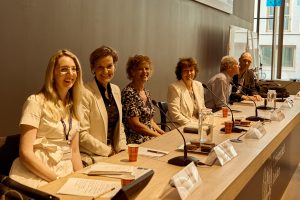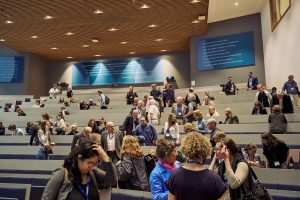Previous Congresses
Previous Congresses

Every three years ENIUGH convenes the European Congress in World and Global History. Since the inaugural congress in 2005 it has developed into an outstanding meeting place for scholars in the fast developing fields of world, global and transnational history and the adjacent disciplines. The number of participants has increased steadily, and the success of the congress can be explained, among other factors, by its openness both to young and experienced scholars alike. The congress has become a forum for researchers to present and discuss their latest findings as well as to inform each other about new organisational patterns in the fields of teaching and research. It offers information and expertise on undergraduate and graduate teaching as well as PhD-programmes and provides the opportunity to develop emerging research agendas in transnational teams and to get the latest news about European and various national funding schemes. A book exhibition, a presentation of teaching programmes and a variety of social events accompany the scientific programme. ENIUGH is constantly striving to create an intellectually inspiring environment for its congresses in cooperation with local partners.
The Hague 2023

The Seventh European Congress on World and Global History was hosted by Leiden University on its campus in The Hague, UN City of Peace and Justice, from 29 June to 1 July 2023. Taking inspiration from its hosting location, the congress explored the main theme of “Conflict and Inequity, Peace and Justice: Local, Regional and International Perspectives” and was dedicated to discussing structural and specific causes of conflict and inequity as well as the corollary features of various quests for peace and justice. By exploring these causes and quests on the local, regional, transregional, and global scale, more than 250 international researchers in 64 panels shed light on how the dynamics of conflicts and struggles for peace have shaped the lives of peoples and the development of sociopolitical orders in all historical periods and around the globe. Combining insights from diverse disciplines and scholarly traditions, the congress thus contributed to a better understanding of the challenges and potentials of ongoing global transformations and all their political, social, economic, and cultural repercussions.
In addition to these multi-faceted and in-depth presentation by scholars from all over the world, the conference highlighted specific views from The Hague as a centre of multilateralism, internationalism(s) and as a UN city in a time of crises. Researchers of the hosting institution, Leiden University, presented their thoughts and findings on “Citizen Diplomacy, New Diplomatic History, and Questions of Historical Agency” as well as on “The Pasts, Presents and Futures of Multilateralism” and deliberated new directions and possibilities for the field of Global History in the Closing Roundtable “Global History. Looking to the Future”. Please find the complete programme here.
All rights reserved
Turku 2021
The Sixth ENIUGH Congress was originally to take place in June 2020 in Turku, Finland, hosted and organized by Åbo Akademi University. By virtue of the global spread of Covid-19 at the beginning of 2020, the ENIUGH Steering and Organising Committees in Leipzig and Turku decided to postpone the congress for a year. Building on the experience of new format in which scientific exchange has taken place since the outbreak of the pandemic, the congress finally took place online from 15 June to 19 June 2021. The first four days covered the official panel program with online sessions and discussions. On the last day, June 19th, all the impressions from the congress days before were ventilated.
Under the theme “Minorities, Cultures of Integration and Patterns of Exclusion”, we sought to stimulate and discuss research on minorities and the processes of past and present minoritization as well as the resistance they engender from a global perspective. We aimed to analyse the various concepts of minority and minority positions as well as practices and narratives of inclusion, belonging, and exclusion with a focus on transnational and transregional constellations as well as comparative perspectives. Addressing the exposure to and challenge of historical and contemporary mechanisms and policies of marginalization and exclusion in their relation to past and present cultures of integration, we hoped to stimulate a reflection on the normative underpinnings of societies. With the Sixth ENIUGH Congress, we also continued to explore the relations, transfers, and entanglements between states, peoples, communities, and individuals, situated in or spanning different regions of the world in a comparative and a longue durée perspective. The common emphasis was again a commitment to transcending the confines of national and Eurocentric historiographies.
Download a PDF version of the complete conference programme here.
Budapest 2017
Paris 2014
London 2011
Recent decades have seen the re-emergence and, on an unprecedented scale, the further development of various interacting strands of world, global and transnational history, all sharing the common aim of transcending national historiographies. Central to these intellectual enterprises has been the study of connections and comparisons. These perspectives provide for sustained reflection on a great variety of themes and studies. Under the framework of “Connections and Comparisons” about 100 panels presented new findings on research topics, including the following:
- Entanglements between polities, societies, communities and individuals situated in, or spanning, different regions of the world
- Interactions between humanity and the environment, including those which developed over the very long term, through the cultural and economic histories of material and social life
- Histories of empires, large-scale crises, international organisations, and the intercontinental sources and consequences of revolutions, whether political, technological, social or ideological
- Exchanges on oceans as spaces of sustained interaction between communities from different continents, the experience and consequences of migration, periods of ‘de-globalisation’ and ‘globalisation’
Not least, this included a critical reflection on the methodological and conceptual issues involved in comparative, transnational and entangled histories: both in general terms as well as in relation to specific areas of historical inquiry, from religions to real wages and from diasporas to epistemic communities. The common emphasis was a commitment to transcend national historiographies and explore different approaches to wide-ranging comparisons. The program of the congress can be downloaded here.
Dresden 2008
Leipzig 2005
The first congress was held in 2005 in Leipzig with about 300 participants from all over Europe and other parts of the world, meeting in almost 50 panels. Three purposes guided the three day conference:
- giving a broad overview of the numerous efforts in various European countries, not only with respect to research questions, but also with regard to how world and global history is or should be taught at schools and universities
- stimulating a discussion about the intellectual traditions of world history writing, which are viewed in various European countries as a positive reference or as the background for the current debates in world and global history
- addressing fundamental methodological questions of today’s global history writing since, especially from a European perspective, world history has to confront the long tradition of Eurocentric thinking and to explore new ways of analysing the relationship between Europe and extra-European regions, as well as reflecting on the role of Europe or its nation states in international organizations and global networks.
The opening speeches were given by Prof. Michael Geyer (University of Chicago) and Prof. Patrick O’Brien (London School of Economics). The closing event was a round table discussion with William Clarence-Smith (SOAS London), Patrick Fridenson (EHESS Paris), Alexander Nützenadel (Universität zu Köln), Hannes Siegrist (Universität Leipzig) and Peer Vries (Universiteit Leiden). Reports on most of the panel discussions are published in an issue of the journal “Historical Social Research” (May 2006) as well as in the online-forum ‘history.transnational’.The program and report of the congress can be downloaded here.